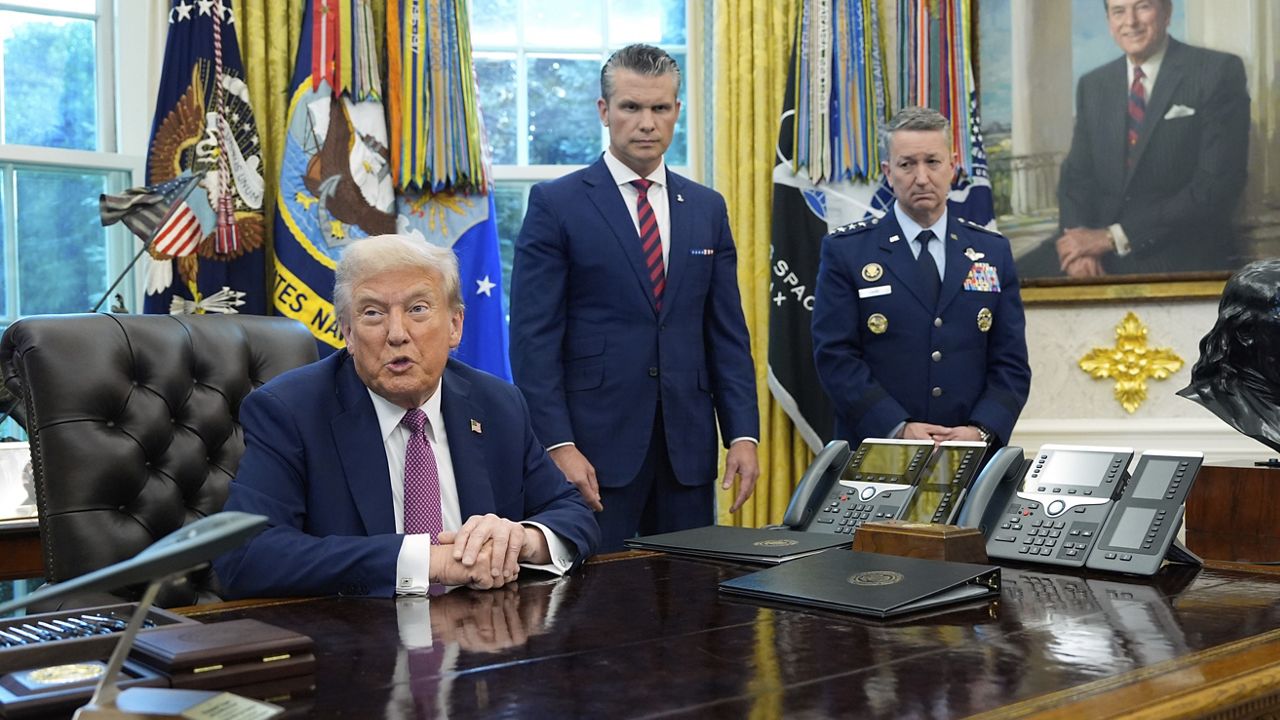WASHINGTON — President Donald Trump is leaning more and more on the U.S. military in his crackdown on undocumented immigrants — from deploying the National Guard to American cities to temporarily assigning military lawyers as immigration judges to chip away at the court backlog of more than 3.4 million cases nationwide. There is a backlog of more than 416,000 immigration cases in Texas alone. But legal experts are wary of giving military lawyers these new duties.
With the nation’s largest immigration detention facility opening at the Fort Bliss Army Base in El Paso, it is clear just how much Trump is using the military for immigration enforcement. El Paso immigration attorney Alexis Lucero said he is growing more concerned after U.S. Defense Secretary Pete Hegseth approved the use of as many as 600 military lawyers as immigration judges.
“The shift that we see from civilian attorneys to more attorneys based out of the Department of Defense is extremely alarming. Now the issue is that the administration is trying to remedy an error or an emergency that they created on their own. They have gotten rid of personnel. They have gotten rid of immigration judges that were experts in their field,” Lucero told Spectrum News.
“This is where the Trump administration tends to test the waters a little bit more, applying more military rules, more military apparatus to the immigration, civil system,” he continued.
Since Trump’s inauguration, 100 immigration judges were fired or not replaced when they left voluntarily. One of those immigration judges who was let go in February was Kerry Doyle, who is now an attorney at Green and Spiegel, an immigration law firm.
“There’s such a shortage of immigration judges, it seemed counterproductive for them to be firing immigration judges,” said Doyle, who was appointed by the Biden administration in December. “I had over 25 years of experience in the immigration field, both in private practice and in the nonprofit world, and then three and a half years in the government, as well, so, I was well-qualified.”
When asked to react to the Pentagon’s plan to temporarily use military attorneys as immigration judges, Doyle said, “It really is kind of a kick in the gut, because, you know, all of us went through a long process to be immigration judges, who are all very interested in serving the country and with the mission of the agency to support hearings and the people coming to be heard.”
Transferring 600 military lawyers would technically double the number of immigration judges at the Justice Department, but retired Maj. Gen. Charles Dunlap of the Air Force finds it “troubling.” He said attorneys might not be fully versed in the complexities of immigration law.
“There are plenty of military lawyers who have experience and administrative hearings. Immigration Law is its own area, and it takes a lot of study and practice, frankly, to be expert at it to the point where you would be a competent, in my judgment, a competent immigration lawyer,” Dunlap, who is now professor of the practice of law at Duke University Law School, said. “To eviscerate the military to serve this on an extended basis, in particular, I think is very troubling.”
Dunlap said it is also unclear how the temporary transfer would affect military operations.
“We’re facing some very challenging times with China, Russia, Iran, North Korea, and the focus needs to be on these external threats, rather than, pulling away resources for this particular internal problem, which I believe is best handled by civilian authorities,” he said.
The Department of Justice and the Pentagon did not respond to Spectrum News’ requests for further comment.
The White House did not answer Spectrum News’ questions about the training military attorneys will go through and why it would be sufficient, but a White House official said, “The administration is looking at a variety of options to help resolve the significant backlog of immigration cases, including hiring additional immigration judges. This should be a priority that everyone – including those waiting for adjudication – can rally around.”
According to the Associated Press, the military lawyers’ assignments would last for about six months, with the option of being renewed.
